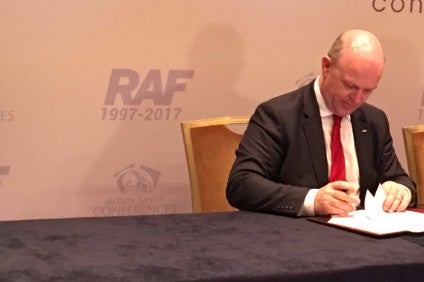
AvtoVAZ says it is looking to significant push for exports as it looks to leverage the Russian government's drive through Decree 905 to encourage domestic companies to search for new business overseas.
External pressures on Russia, such as falling oil prices, international economic sanctions and high inflation, have combined to depress the ruble, giving home-grown producers an export advantage, but the gradual improvement in the economy has accelerated moves to make exports more competitive.

Discover B2B Marketing That Performs
Combine business intelligence and editorial excellence to reach engaged professionals across 36 leading media platforms.
The Kremlin has enacted Decree 905 to encourage Russian companies to look overseas, as the home market continues to present major sales challenges for automakers and AvtoVAZ is one of 16 companies to have taken advantage of the US$345m available for export initiatives.
"Not just one year – three years," AvtoVAZ CEO, Nicolas Maure, told just-auto concerning Decree 905 on the sidelines of this year's Russian Automotive Forum in Moscow organised by Adam Smith Conferences.
In Soviet times, AvtoVAZ used to export around 350,000 cars per annum. In 2016, we did fewer than 20,000, which is extremely low and we are pushing a lot to restart exports, first to CIS countries like Kazakhstan and Belarus.
"There are discussions with the government – what are the modalities of using this so it is open and simple? Decree 905 is absolutely critical to succeed. 2016 [was] at a very low point. In Soviet times, AvtoVAZ used to export around 350,000 cars per annum. In 2016, we did fewer than 20,000, which is extremely low and we are pushing a lot to restart exports, first to CIS countries like Kazakhstan and Belarus.
"A little bit in Europe, but also in other countries like [the] Middle East, Africa and Latin America. I was in Cuba last week for this. You meet different customer expectations, different regulations, different road conditions, so [all] this, cars need to be adapted in many ways.
"To do exports, you need the right terms [of] financing, the right languages and be able to organise connection with importers and distributors in those countries."
There is no doubt exporting 'Made in Russia' products is occupying Moscow's mind, as it seeks to present a positive face to the world, with prime minister Dmitry Medvedev noting last year in comments made public by the government-backed Russian Export Centre: "Export is not scary – this is a very important phrase.
"Look, lately we seem to have become a little isolated – the political situation, the impact of sanctions, difficult economic conditions, have their effect. And in no case shall we turn away and say we will stay at home and do with our own hands only those products that can be sold in the Russian market.
"We must still enter international markets. Moreover, we must do it with that proletarian straightforwardness, as businesses of the late 80s, 90s, did. Almost any Soviet enterprise, any cooperative which was then created, recorded the importance of export activity. Not just to sell something quickly, but realising entering foreign markets is vital."
The Russian prime minster, participating in the Sochi International Investment Forum, noted the import substitution programme ought to be matched with the export strategy.






